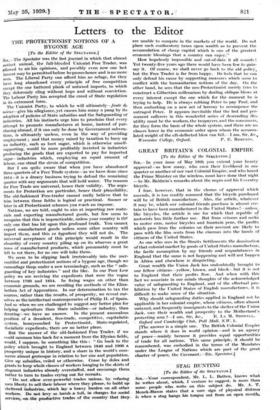Letters to the Editor
THE- PROTECTIONIST NOTIONS OF A BYGONE AGE
• [To the Editor of the SPECTATOR.] Ssa,—The Spectator was the last journal in which that almost extinct animal, the full-blooded Unionist Free Trader, was allowed to air his opinions, and possibly even now one last lament may be permitted before he passes hence and is no more seen. The Liberal Party can afford him no refuge, for they have long abandoned every principle of free competition except the one battered plank of untaxed imports, to which they dolorously cling without hope and without conviction. The Labour Party has accepted the creed of State regulation in its extremest form.
The Unionist Party, to which he will ultimately—faute de mieux—give his allegiance, yet causes him many a pang by its adoption of policies of State subsidies and the Safeguarding of industries. All his instincts urge him to proclaim that every attempt to promote manufactures at home, instead of pur- chasing abroad, if it can only be done by Government subven- tions, is ultimately useless, even in the way of providing employment ; and that money raised by taxation to buoy up an industry, such as beet sugar, which is otherwise unself- supporting, would be more profitably invested in industriei producing the goods that are exported to pay for imported sugar—industries which, employing an equal amount of labour, can•stand the strain of competition.
But I am quite aware that when you have abandoned three-quarters of a-Free Trade system—as we have done since
1914—it is a dreary business trying to defend the remaining quarter with any arguments that will hold water. The reasons for Free Trade are universal, hence their validity. The argu- ments for Protection are particular, hence their plausibility. The old-fashioned Free-trader cannot really believe that to trim between these faiths is logical or practical. Sooner or later in all Protectionist schemes you reach an impasse.
Nations, we are told, ought to aim at importing raw mate- rials and exporting manufactured goods, but few seem to recognize that this is impracticable, unless your country is the only one that has hit upon this profound truth. You cannot export manufactured goods unless some other country will import them, and this ex hypothesi they will not do. The universal acceptance -of this principle would result in the absurdity of every country piling up on its wharves a great mass of manufactured products, which presumably must be left to rot there, for no one will take them.
We seem to- be slipping back irretrievably into the mer- cantilist and protectionist notions of a bygone age, though we
camouflage their under a new terminology, such as the " safe- guarding of key industries " and the like. In our Poor Law policy we are reviving the expedients that were the vogue between 1780 and 1834. In fixing wages on other than economic grounds, we are recalling the methods of the Eliza- bethan Act of Apprentices. In our determination to tax the sources; rather than the results, of prosperity, we reveal our- selves as the intellectual contemporaries of Philip II. of Spain-. And so when we are challenged to suggest any better plan for helping agriculture than State subsidies—or industry, than demtingwe have no answer. In the present anomalous position of a decadent, free-trade, competitive, capitalistic system, honeycombed by Protectionist, State-regulated, Socialistic expedients, there are no better plans.
But the answer of the old-fashioned Free Trader, if we could summon him back for a moment from the Elysian fields, would; I' suppose, be something like this : " Go back to the policy which brought to England between 1840 and 1900 a prosperity unique in history, and a share in the world's com- merce almost grotesque in relation to her size and population. Give up subsidies, veiled or otherwise. Cease by- doles and, grants to keep whole classes of workers hanging to the skirts of stagnant industries already overstaffed, and encourage them rather to turn to trades crying out for recruits. . .
" Do.-not allow over-powerful -trades unions, by refusing men liberty to sell their labour where they please, to build up sheltered industries, which lay a heavy burden on all other worker's. Do not levy so harsh .toll, in charges for.soeial . services, an.-the prodtictive trades of the country that they are unable to compete in the markets of the world,. Do not place such confiscatory taxes upon wealth as to prevent the accumulation of cheap capital which is one of the greatest economic blessings that a country can enjoy."
How hopelessly impossible and out-of-date it all sounds ! -Yet twenty-five years ago there would have been few to gain- say it. Of course, we shall never go back to the old policy, -but the. Free Trader is far from happy. - He feels that he can only defend his cause by supporting measures which seem to conflict with the humanitarian notions of the day. On the other hand, he sees that the meo-Protectionist merely tries ti construct a Gilbertian millennium by dealing oblique blows at every interest except the one which for the moment he is trying to help. He is always robbing Peter to pay Paul, and then embarking on a new act of larceny to recompense the outraged Peter. It appears inevitable that the last and per- manent sufferers in this wonderful series of descending dis. utility must be the workers, the taxpayers, and the consumers, for they form the basis of the whole system, and there arc no classes lower in the economic order upon whom the accumu- lated weight of the oft-deflected blow can fall.—I am, Sir, &c.,








































 Previous page
Previous page